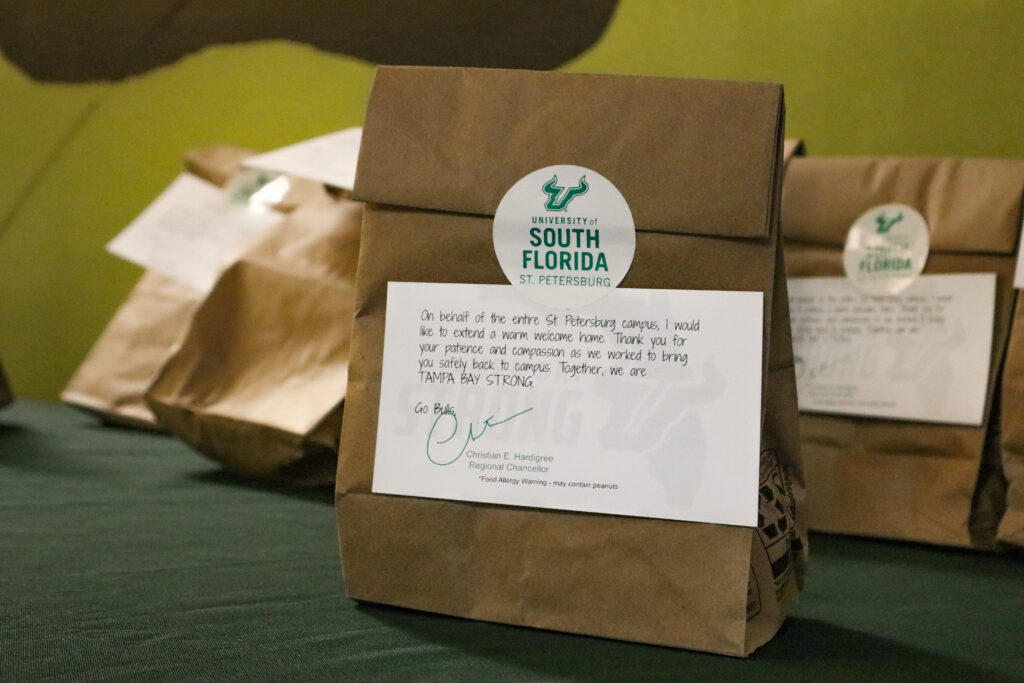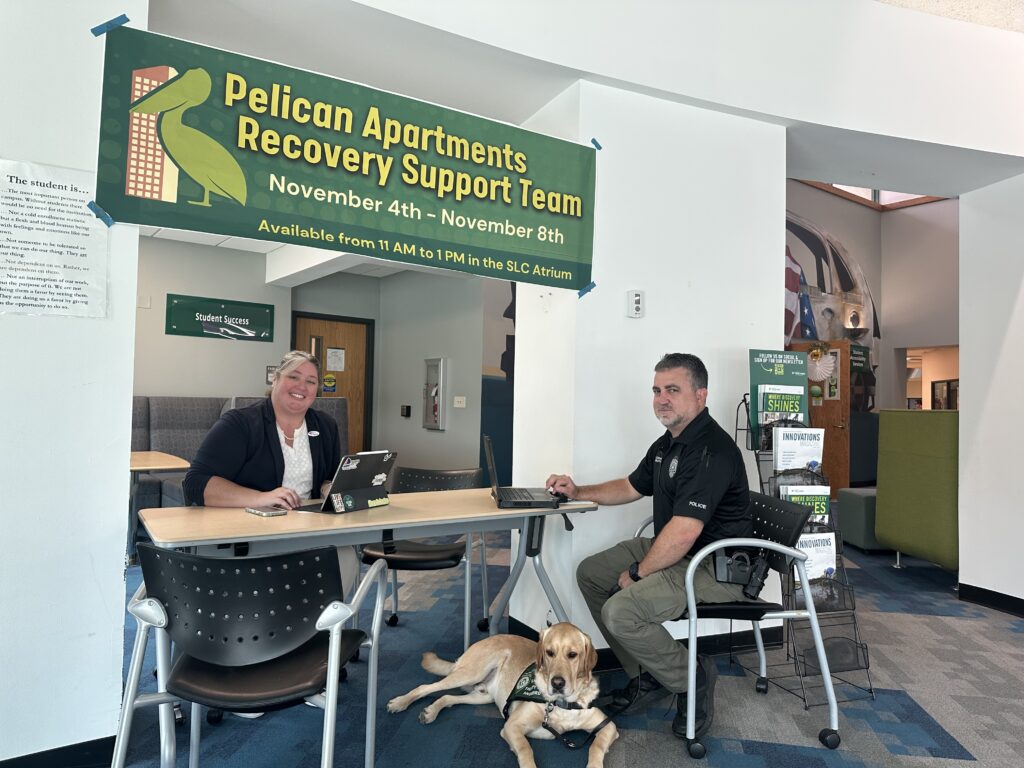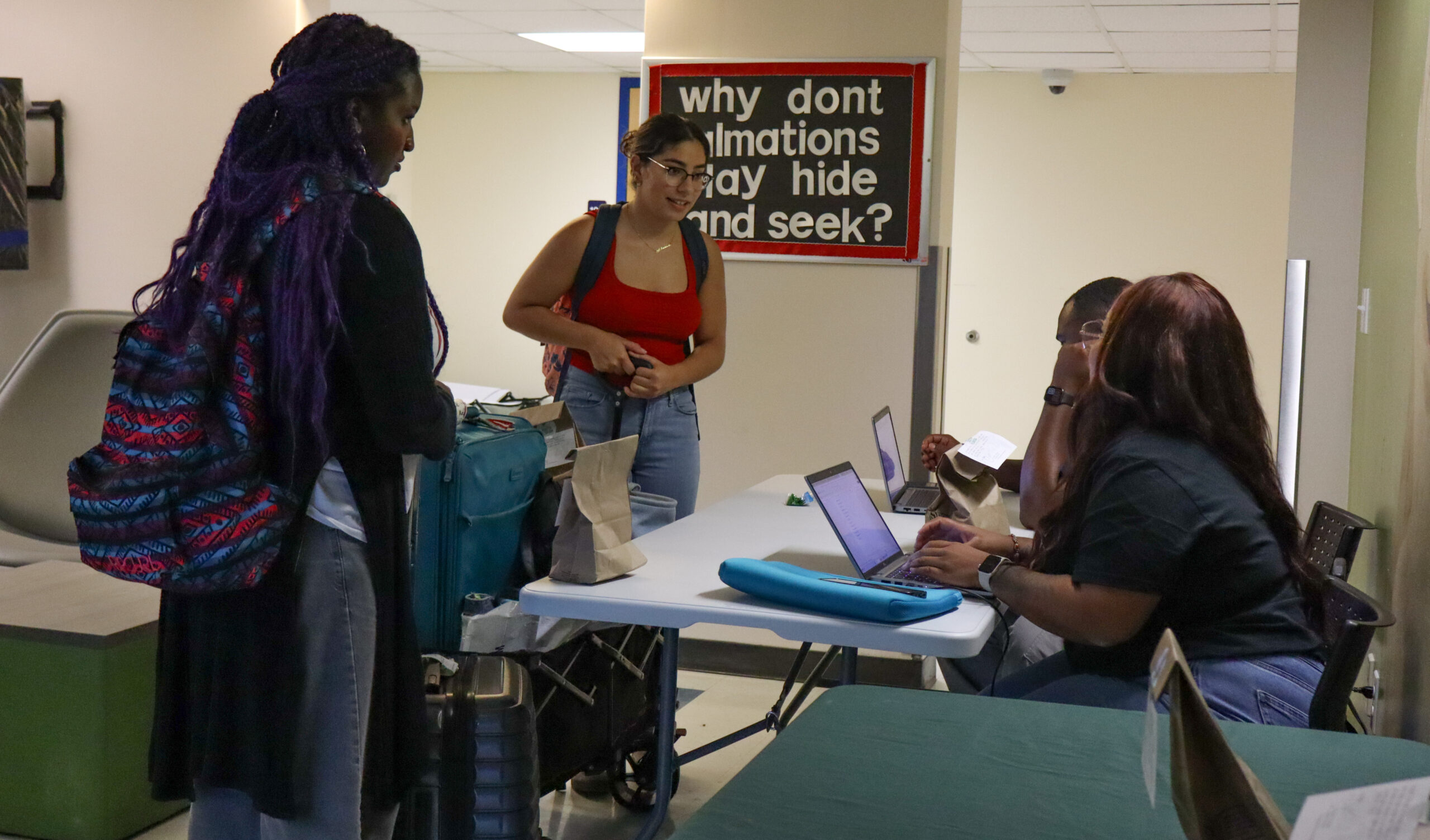Photo by Mahika Kukday | The Crow’s Nest
By Mahika Kukday
Normalcy. Every Floridian has been chasing it after months marked with back-to-back hurricanes and emotional stress. But for residents of USF St. Petersburg’s Pelican Apartments (RHO), it’s still just out of reach.
They evacuated for Hurricane Milton on Oct. 7. Then, their residence hall was closed due to water damages, leaving them locked out of their rooms and their routines for over three weeks.
And when students returned to their dorms in the week of Oct. 28, it wasn’t exactly a homecoming to celebrate.

Photo Mahika Kukday | The Crow’s Nest
The Crow’s Nest conducted an independent survey of 34 RHO residents who were displaced due to the building’s closure, to gauge reactions and emotions after the phased reopening.
Here’s how they’re feeling.
Betrayed
An overwhelming majority of students surveyed reported missing, damaged and stolen items when they returned to their rooms. They expressed feeling uneasy about strangers going through their belongings, sometimes unnecessarily.
Elly Fisher, mother of freshman business major Henry Fisher, said over $600 in cash was missing from her son’s zipper pouch that was not in plain view.
“Workers had enough autonomy that they had the opportunity to steal from vulnerable students,” Elly Fisher said. “The police indicated that it was not realistic to go through three weeks of video to see who accessed which rooms.”
She appreciated the housing department’s communication efforts, and that the building was repaired before students were let back in. However, she said her son was constantly checking for other stolen items.
Henry Fisher filed a police report with the University Police Department around 9 p.m. on Oct. 29, an hour after he returned. The status of the report is unknown at the time of publication.
Sarah Jade Hunn, digital communications and multimedia journalism sophomore, was also greeted by an unpleasant situation when she returned to her fifth-floor room on Oct. 29.
“The construction people peed all over my toilet seat, my whole bathroom smelled like pee when we returned and it’s not from us two very clean girls,” Hunn said.
She reported a broken picture frame and excessively messy room, which was difficult to rearrange alone.
“I feel very disrespected,” Hunn said, expressing disappointment at the invasion of privacy. She also mentioned that her friends reported electronics, Apple products and underwear going missing.
According to official communication from housing, the reopening was changed from a single date to a tiered system because of additional issues with the HVAC system. That, combined with moisture in the drywalls being the original reason for the building’s closure, led students to believe that mostly items near the vents or against the walls would be handled.
But, multiple residents said they had evidence of things being shuffled around in their drawers, near their beds and other areas.
“All of my jewelry had been placed in a box under the bed. This took me an hour to find,” said junior biology major Maya Shaffer.
Third-floor resident Ruth Bergman found her laundry in someone else’s hamper, and said that a sailboat decoration from her desk was broken and placed under her bed.
Like Bergman, many students said the unnecessary handling of personal items made them feel that the university betrayed their trust.
Relieved
Pre-graphic arts sophomore Kea Shindle found a damaged poster, a rearranged living room and an unexpectedly remade bed when she arrived back to her fifth-floor room.
Despite the minimal – and somewhat confusing – changes, she is “very happy to be back.”
“I love this school and that hasn’t changed because of this situation, but it has been a very stressful month to say the least,” Shindle said.
She emphasized that it was difficult being away from campus while normal life went on without her.
USF St. Petersburg resumed regular classes and hybrid business operations post-hurricane on Tuesday, Oct. 15. But RHO’s 352 residents only started moving back in over two weeks later.
“It feels nice to get back into the swing of things after such a hectic few weeks,” said Lilly Kennedy, a digital communications and multimedia journalism sophomore.
She expressed deep dissatisfaction with the university’s reluctance to provide refunds to displaced students until faced with a petition. However, her seventh-floor room suffered no missing or damaged items, and she appreciated the chance to get back to normal life within the estimated re-entry timeline.
Victor Gallego-Anyi is a biology senior. As a first-floor resident, he was allotted the latest re-entry date of Nov. 1. Gallego-Anyi returned to an almost untouched room, but said that keeping up with classes as a commuter took a toll on him.
He is glad that the “nightmare is over.”
“I’ve [also] realized the importance of treasuring time with your friends who live on campus, and … of taking grades seriously even in the toughest of circumstances,” Gallego-Anyi said.
Conflicted
Lauren Richard, a junior English major, echoed the mixed emotions of countless others.
Her third-floor room saw no missing or damaged items, and was only slightly rearranged. However, she was unhappy with how emergency housing was handled, and that some extra measures by housing were actually just the bare minimum.
“You are not providing a luxury by giving students what they are already paying for,” Richard said, commenting how “providing” three meals a day to those in emergency housing was nothing of note, because students already pay for their meal plans.
At the same time, she feels that housing dealt with the issue as fast as possible.
“I don’t hold any ill will towards the housing department as they … did everything in their power to make things as right as possible, as efficiently as possible.”
Vulnerable
Weeks after the construction team’s departure, residents worry about their safety and the level of access that strangers had to their belongings.
“I feel very violated knowing there were a bunch of random people in the building and in my room,” said Morgan Nieman, a graphic arts junior.
She said she is “deeply angered and frustrated,” and that she doesn’t feel safe knowing the construction team was unsupervised in her room.
Addison Mark is a sixth-floor resident of RHO, and an environmental science and policy junior. She didn’t like how her room door was unlocked when she returned, knowing that anyone could have entered.
“Strangers were in my room touching my stuff and who knows if they put a camera or something in the bathroom or my bedroom,” Mark said.
From Nov. 4 to Nov. 8, a table was set up in the Student Life Center where students could file reports and voice their concerns to the spontaneously founded Pelican Apartments Recovery Support Team.

Photo by Mahika Kukday | The Crow’s Nest
Kasey Szel, coordinator of Leadership and Student Organizations, is part of the eight-person group dedicated to supporting RHO students. She said that over the duration of the tabling, all the student concerns were logged in a spreadsheet with as much detail as possible.
Szel said that Laura Zuppo, regional assistant vice chancellor of student success, who spearheaded the operation, told the RHO support team to reach out to their group of students by noon on Nov. 8.
“We kind of ‘claimed’ a couple students that we already knew,” Szel said. “So everybody had a specific person that they could go to who had their best interests [at heart].”
Students have been contacted by their designated team member and emailed by housing. The efforts are ongoing, and so far, students have been asked whether they’d like their items to be replaced, if they need someone to talk to, and more.



